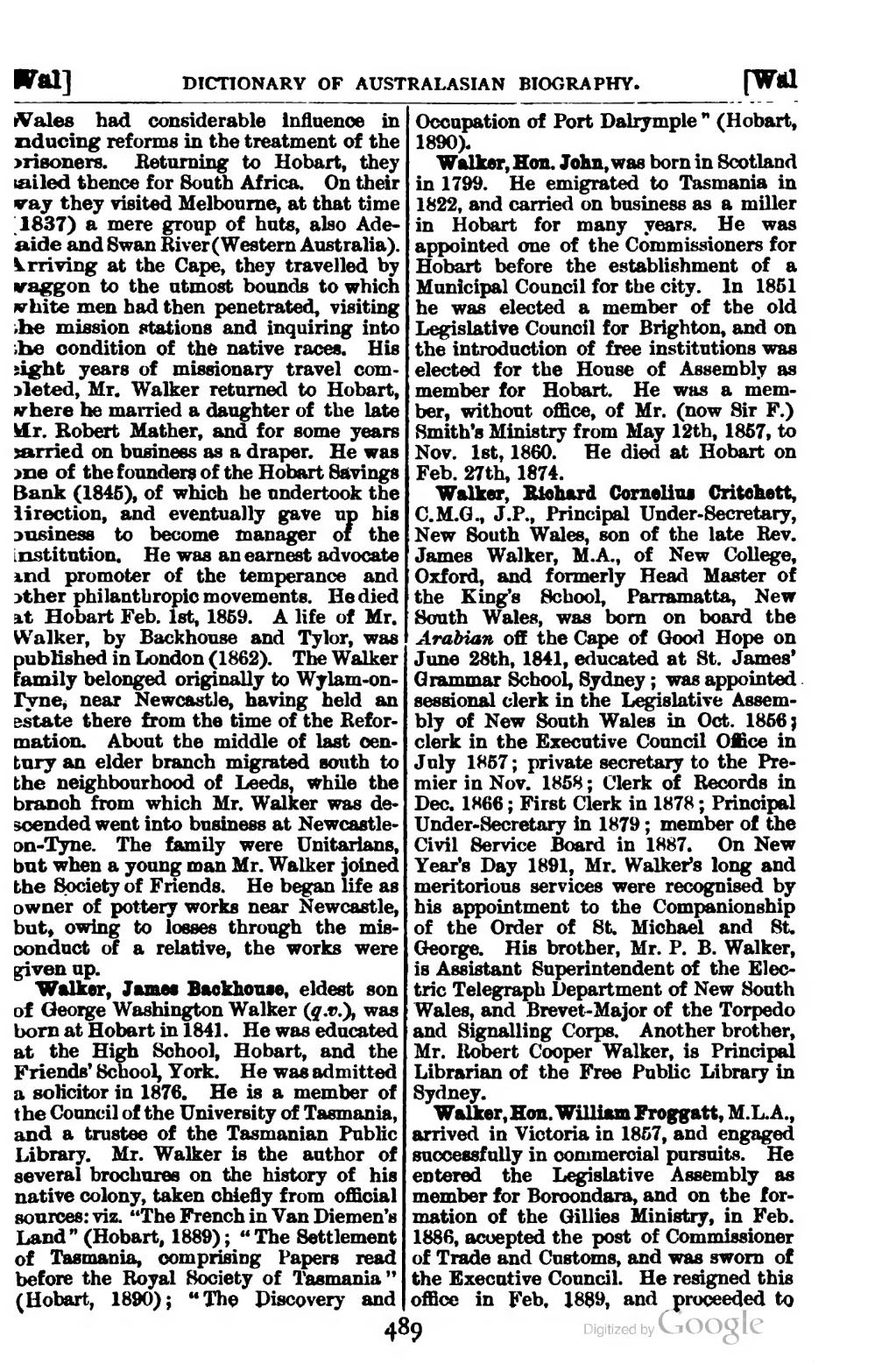Wales had considerable influence in inducing reforms in the treatment of the prisoners. Returning to Hobart, they sailed thence for South Africa. On their way they visited Melbourne, at that time (1837) a mere group of huts, also Adelaide and Swan River (Western Australia). Arriving at the Cape, they travelled by waggon to the utmost bounds to which white men had then penetrated, visiting the mission stations and inquiring into the condition of the native races. His eight years of missionary travel completed, Mr. Walker returned to Hobart, where he married a daughter of the late Mr. Robert Mather, and for some years carried on business as a draper. He was one of the founders of the Hobart Savings Bank (1845), of which he undertook the direction, and eventually gave up his business to become manager of the institution. He was an earnest advocate and promoter of the temperance and other philanthropic movements. He died at Hobart Feb. 1st, 1859. A life of Mr. Walker, by Backhouse and Tylor, was published in London (1862). The Walker family belonged originally to Wylam-on-Tyne, near Newcastle, having held an estate there from the time of the Reformation. About the middle of last century an elder branch migrated south to the neighbourhood of Leeds, while the branch from which Mr. Walker was descended went into business at Newcastle-on-Tyne. The family were Unitarians, but when a young man Mr. Walker joined the Society of Friends. He began life as owner of pottery works near Newcastle, but, owing to losses through the misconduct of a relative, the works were given up.
Walker, James Backhouse, eldest son of George Washington Walker (q.v.), was born at Hobart in 1841 . He was educated at the High School, Hobart, and the Friends' School, York. He was admitted a solicitor in 1876. He is a member of the Council of the University of Tasmania, and a trustee of the Tasmanian Public Library. Mr. Walker is the author of several brochures on the history of his native colony, taken chiefly from official sources: viz. "The French in Van Diemen's Land" (Hobart, 1889); "The Settlement of Tasmania, comprising Papers read before the Royal Society of Tasmania" (Hobart, 1890); "The Discovery and Occupation of Port Dalrymple" (Hobart, 1890).
Walker, Hon. John, was born in Scotland in 1799. He emigrated to Tasmania in 1822, and carried on business as a miller in Hobart for many years. He was appointed one of the Commissioners for Hobart before the establishment of a Municipal Council for the city. In 1851 he was elected a member of the old Legislative Council for Brighton, and on the introduction of free institutions was elected for the House of Assembly as member for Hobart. He was a member, without office, of Mr. (now Sir F.) Smith's Ministry from May 12th, 1857, to Nov. 1st, 1860. He died at Hobart on Feb. 27th, 1874.
Walker, Richard Cornelius Critchett, C.M.G., J.P., Principal Under-Secretary, New South Wales, son of the late Rev. James Walker, M.A., of New College, Oxford, and formerly Head Master of the King's School, Parramatta, New South Wales, was born on board the Arabian off the Cape of Good Hope on June 28th, 1841, educated at St. James' Grammar School, Sydney; was appointed sessional clerk in the Legislative Assembly of New South Wales in Oct. 1856; clerk in the Executive Council Office in July 1857; private secretary to the Premier in Nov. 1858; Clerk of Records in Dec. 1866; First Clerk in 1878; Principal Under-Secretary in 1879; member of the Civil Service Board in 1887. On New Year's Day 1891, Mr. Walker's long and meritorious services were recognised by his appointment to the Companionship of the Order of St. Michael and St. George. His brother, Mr. P. B. Walker, is Assistant Superintendent of the Electric Telegraph Department of New South Wales, and Brevet-Major of the Torpedo and Signalling Corps. Another brother, Mr. Robert Cooper Walker, is Principal Librarian of the Free Public Library in Sydney.
Walker, Hon. William Froggatt, M.L.A., arrived in Victoria in 1857, and engaged successfully in commercial pursuits. He entered the Legislative Assembly as member for Boroondara, and on the formation of the Gillies Ministry, in Feb. 1886, accepted the post of Commissioner of Trade and Customs, and was sworn of the Executive Council. He resigned this office in Feb. 1889, and proceeded to
489
